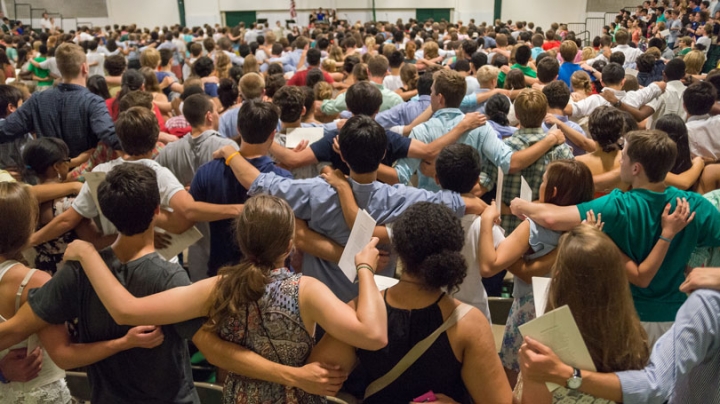The College has issued a far-reaching plan to increase diversity and inclusion in the Dartmouth community.
The plan, the product of four months of work in the Inclusive Excellence (IE) initiative, is called the “Action Plan for Inclusive Excellence,” and was sent today to all faculty, students, staff, and alumni by the executive committee that drafted the document. The committee members are President Phil Hanlon ’77, Provost Carolyn Dever, Executive Vice President Rick Mills, and Vice President for Institutional Diversity and Equity Evelynn Ellis.
“Dartmouth needs no more reports, task forces, or initiatives that occur in isolation. Rather, Dartmouth needs action, alignment, accountability, and transparency. Today we stand together and commit our institution to cultural change,” committee members write in a letter that accompanies the plan.
“Dartmouth’s capacity to advance its dual mission of education and research depends upon the full diversity and inclusivity of this community. We have work to do,” they write.
The plan contains more than three dozen new initiatives and enhancements of existing programs to be put into place in the coming months. A thread that runs through all of the work is the promise to be accountable and open about progress made on the work.
“We recognize that this effort is a marathon and not a sprint, and we commit ourselves to constant vigilance and clarity regarding our efforts and their results,” the letter says.
For the next decade, the College will dedicate the resources necessary to recruit and hire about 50 faculty members from underrepresented groups who will join the college’s four faculties. The positions will include both new and existing faculty lines. In addition, the plan lays out efforts to retain talented underrepresented faculty and staff, and implement training programs and outreach to combat bias in the workplace and among students.
“We must increase diversity, particularly among our faculty and staff,” the letter says.
Two years ago, Dever pledged to increase minority representation on the faculty from 16 percent of the total, which it was in 2014, to 25 percent by 2020. The IE plan reports progress in the first two years of this initiative, with advances in each of Dartmouth’s faculties.
The IE plan builds on last year’s Moving Dartmouth Forward (MDF) effort and expands the focus on diversity and inclusivity. As with MDF, the IE plan will create an external review committee to evaluate and report on progress.
“The actions we outline here mark that commitment with a period of focused action, supported by clear, accessible communication about our progress,” says the letter.
The full plan is available on the IE website. Initiatives in the plan include:
- Implementing programs at all levels to address implicit bias—judgments or attitudes that affect decisions in an unconscious manner.
- Conducting exit interviews with faculty and senior staff to understand why they leave the institution and interviewing those who stay at Dartmouth as well, to understand what keeps them at the College.
- Expanding fellowships programs for underrepresented minorities and adding an Asian American studies fellowship and four postdoctoral fellowships in areas that support diversity.
- Sponsoring an annual debate—on a topic of political or social importance—by experts who represent diverse perspectives.
- Developing co-curricular offerings for students on cross-cultural communication.
- Working with faculty governance processes to support development of a required undergraduate course on human difference.
- Reviewing tenure and promotion processes in all of Dartmouth’s schools.
- Accounting for the heavier obligation to mentor students that falls to employees of color and women, when evaluating work by faculty and staff.
- Creating opportunities in the new undergraduate housing system for discussion of diversity and inclusion.
- Training on bias and diversity for the College trustees, who have committed to increase the attention paid to matters of diversity and inclusion.
- Increasing connections between alumni and students of color and LGBTQIA students.
- Commissioning work to understand and learn from Dartmouth’s historical treatment of minorities, and marginalized and excluded groups. The work will be part of the College’s 250th anniversary celebration in 2019.
- Creating a website to report on progress made on all of the IE initiatives.

